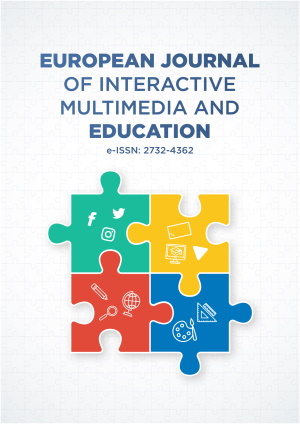Research Article
Science Teachers’ Level of Technological Knowledge and the Effect of Demographic Variables in Ondo State, Nigeria
More Detail
1 Adekunle Ajasin University Akungba-Akoko (AAUA), NIGERIA* Corresponding Author
European Journal of Interactive Multimedia and Education, 3(1), January 2022, e02202, https://doi.org/10.30935/ejimed/11437
Submitted: 19 September 2021, Published: 20 December 2021
OPEN ACCESS 2159 Views 1473 Downloads
ABSTRACT
This study examines the level of Ondo State science teachers’ Technological Knowledge (TK) and the effect of demographic variables such as school geographical location and gender, with a view to bring about effective teaching of science concept through integration of technology. This study is based on survey research design. The population comprised all science teachers in public secondary schools in Ondo State. Data was collected from 628 science teachers across the three senatorial districts in the State. The instrument used was technological knowledge questionnaire and a reliability coefficient r = (0.93) was obtained using Cronbach Alpha. Two research hypotheses and one question were posed to guide the study. Findings from this study revealed that 66.9% of science teachers in Ondo State have low level of TK, a significant difference between the TK of rural and urban teachers and no significant difference between the TK usage between female and male teachers. It is recommended that government should develop a comprehensive framework for professional development that will assist teachers to develop skills to teach in the 21st century environment.
CITATION (APA)
Ominowa, O. T. (2022). Science Teachers’ Level of Technological Knowledge and the Effect of Demographic Variables in Ondo State, Nigeria. European Journal of Interactive Multimedia and Education, 3(1), e02202. https://doi.org/10.30935/ejimed/11437
REFERENCES
- Farrell, I. K., & Hamed, K. M. (2017). Examining the relationship between Technological Pedagogical Content Knowledge (TPACK) and student achievement utilizing the Florida value-added model. Journal of Research on Technology in Education, 49(3-4), 161-181. https://doi.org/10.1080/15391523.2017.1328992
- Holland, D. D., & Piper, R. T. (2015). Testing a technology integration education model for millennial preservice teachers: Exploring the moderating relationships of goals, feedback, task value and self-regulation among motivation and technological, pedagogical, and content knowledge competencies. Journal of Educational Computing Research, 54(2), 196-224. https://doi.org/10.1177/0735633115615129
- Iheonunekwu, S. (2019). Pedagogy of technology integration in teaching and learning. GRIN Verlag.
- Jang, S.-J., & Tsai, M.-F. (2012). Exploring the TPACK of Taiwanese elementary mathematics and science teachers with respect to use of interactive whiteboards. Computers & Education, 59(2), 327-338. https://doi.org/10.1016/j.compedu.2012.02.003
- Jen, T.-H., Yeh, Y.-F., Hsu, Y.-S., Wu, H.-K., & Chen, K.-M. (2016). Science teachers’ TPACK-Practical: Standard-setting using an evidence-based approach. Computers & Education, 95, 45-62. https://doi.org/10.1016/j.compedu.2015.12.009
- Jeyaraj, I., & Ramnath, R. (2018). A study on technological pedagogical and content knowledge of B. ed student teachers in Puducherry region. World Wide Journal of Multidisciplinary Research and Development, 4(1), 306-308.
- Kaur, P., & Arya, S. (2019). Attitude towards information and communication technology among rural and urban primary and secondary school teachers of Punjab. International Journal of Trend in Scientific Research and Development, 3(3), 859-864. https://doi.org/10.31142/ijtsrd23131
- Luik, P., Taimalu, M., & Suviste, R. (2018). Perceptions of technological, pedagogical and content knowledge (TPACK) among pre-service teachers in Estonia. Education and Information Technologies, 23, 741-755. https://doi.org/10.1007/s10639-017-9633-y
- Ozudogru, M., & Ozudogru, F. (2019). Technological pedagogical content knowledge of mathematics teachers and the effect of demographic variables. Contemporary Educational Technology, 10(1), 1-24. https://doi.org/10.30935/cet.512515
- Roig, R., Mengual, S., & Quinto, P. (2015). Primary teachers’ technological, pedagogical and content knowledge. Comunicar, 4(5), 151-159. https://doi.org/10.3916/C45-2015-16
- Sahin, I. (2011). Development of survey of technological pedagogical and content knowledge (TPACK). TOJET: The Turkish Online Journal of Educational Technology, 10(1), 97-105.
- Sejah, P. (2021). Teacher’s attitude towards information technology in relation to their gender, locality and type of school. International Research Journal on Advanced Science Hub, 3(3), 92-95. https://doi.org/10.47392/irjash.2021.072
- Spazak, L. (2013). Secondary pre-service teachers’ perception of preparedness to integrate technology [PhD dissertation, Indiana University of Pennsylvania]. ProQuest Dissertations Publishing.
- Tavares, R., Vieira, R. M., & Pedro, L. (2021). Mobile app for science education: Designing the learning approach. Journal of Education Science, 11, 79. https://doi.org/10.3390/educsci11020079
- Ugwuanyi, C. S., & Okeke, C. I. O. (2020a). A multimedia instructional package on for enhancing achievement in basic science. International Journal of Advanced Science and Technology, 136(1), 51-60. https://doi.org/10.33832/ijast.2020.136.05
- WAEC. (2018). Senior secondary certificate examinations chief examiners’ report. https://www.waeconline.org.ng
- Wang, J., Tigelaar, D. E. H., & Admiraal, W. (2019). Connecting rural schools to quality education: Rural teachers’ use of digital educational resources. Computers in Human Behavior, 101, 68-76. https://doi.org/10.1016/j.chb.2019.07.009
- Wang, P. (2013). Examining the digital divide between rural and urban schools: Technology availability, teachers’ integration level and students’ perception. Journal of Curriculum and Technology, 2(2), 127-139. https://doi.org/10.5430/jct.v2n2p127
- Yildirim, H. I., & Sensoy, O. (2018). Effect of science teaching enriched with technological practices on attitudes of secondary school 7th grade students towards science courses. Universal Journal of Educational Research, 6(5), 947-959. https://doi.org/10.13189/ujer.2018.060516

 The articles published in this journal are licensed under the CC-BY Creative Commons Attribution International License.
The articles published in this journal are licensed under the CC-BY Creative Commons Attribution International License.